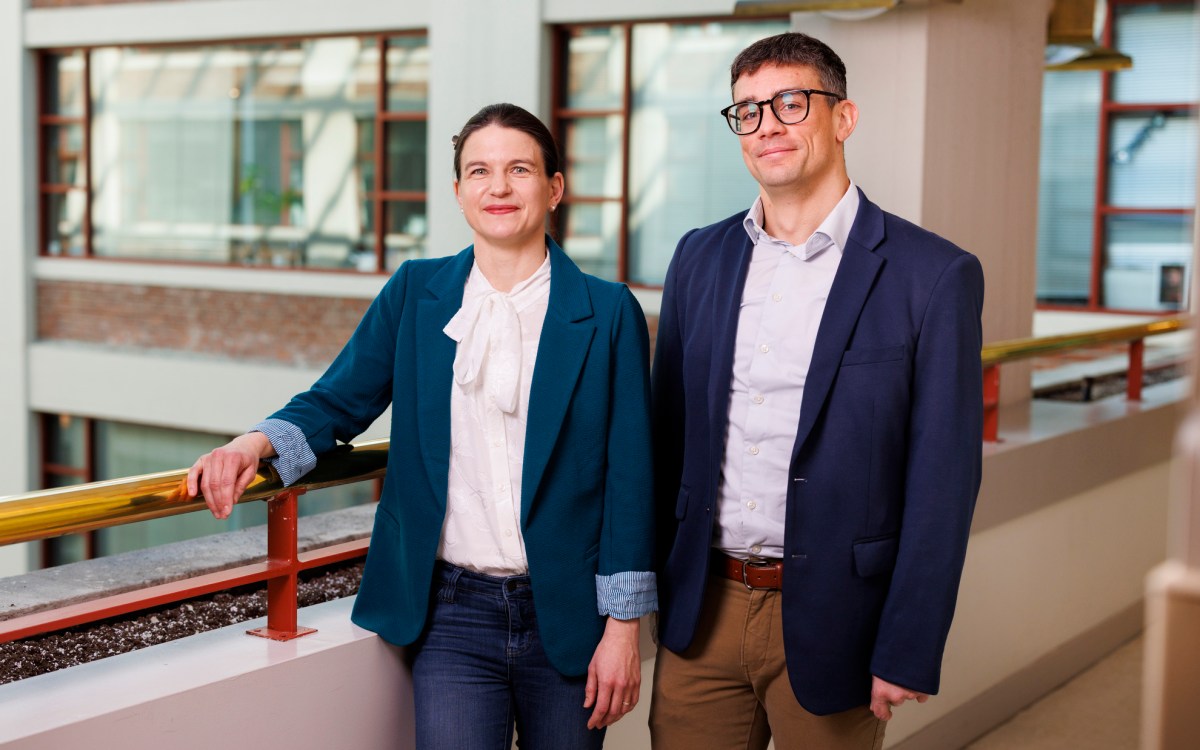More proof that money isn’t everything

“It raises important questions with regard to whether we are investing enough in our youth,” said Tyler VanderWeele about findings from a new study he led on global well-being.
File photo by Niles Singer/Harvard Staff Photographer
Major global study of flourishing ranks wealthy, lower-income nations, reinforces concerns over well-being among youth
A major global study of human flourishing reinforces prior warnings about the lack of well-being among youth, particularly in the U.S., and highlights the adage that money isn’t everything, with middle-income — not wealthy — countries topping a ranking of 22 nations.
“It raises important questions with regard to whether we are investing enough in our youth,” said Tyler VanderWeele, the John L. Loeb and Frances Lehman Loeb Professor of Epidemiology at the Harvard T.H. Chan School of Public Health and one of the study’s lead authors. “Patterns around the world are complex, but in many countries — especially Western countries — this pattern is real.”
The results stem from a huge trove of data gathered by The Global Flourishing Study, a major investigation into individual well-being within specific communities and environments. The survey enrolled about 203,000 people speaking 40 languages and spanning an array of nations, cultures, histories, and economic circumstances. Launched in 2021, the study was conducted on all six inhabited continents and represents about 64 percent of the world’s population, organizers said during a media briefing Monday.
The study’s data allow for comparison across and within nations. Respondents were asked questions about seven variables that together define “flourishing” — health, happiness, meaning, character, relationships, financial security, and spiritual well-being.
It also gathered demographic data such as age, sex, marital and employment status, education, health, religious service attendance, and information about personal history, specifically childhood, including family financial circumstances and exposure to abuse.
VanderWeele called the findings on youth flourishing “troubling.” He said they bear out other recent findings that point to change.
Formerly, a typical life pattern of flourishing looked like a U-shaped curve, with satisfaction highest early and late in life. The lowest point came during the middle years when the pressures of raising children, meeting work expectations, and caring for aging parents come to bear.
It has now shifted to something like a J-shape, with measures of flourishing turning nearly flat from the late teens into the 20s before rising later in life. That pattern was seen in several nations, VanderWeele said, but the U.S. had one of the steepest gradients between flourishing levels of its youth and older adults.
“It’s pretty striking,” said VanderWeele, who is also director of the Human Flourishing Program at Harvard’s Institute for Quantitative Social Science. “It’s real cause for concern.”
The study, published in the journal Nature Mental Health and sponsored by eight private foundations, was led by researchers at Harvard and Baylor universities and included colleagues from 21 institutions, including universities in the U.S., Germany, Poland, Spain, Canada, and the U.K., as well as the Gallup polling firm.
VanderWeele said the national ranking data was the study’s biggest surprise, offering strong evidence that financial circumstances alone don’t guarantee flourishing. The study surveyed 22 countries and one territory (Hong Kong) that organizers said span an array of cultures, races, economic circumstances, and living conditions.
A ranking without financial indicators put Indonesia at the top, followed by Mexico, the Philippines, Israel, and Nigeria. The U.S. was 15th on that list. Adding financial indicators reordered the list slightly, with Israel and Mexico switching places, and Poland moving into the top 5, bumping Nigeria down. The U.S. moved up to 12th in that ranking. Last on both lists, however, was Japan.
Brendan Case, associate director for research at the Human Flourishing Program and a paper author, said the national rankings call into question prevailing models of economic development that raise as examples nations such as Japan — whose rapid post-World War II modernization made it a global industrial power. That contrasts with Indonesia, a nation often cited as an example of the “middle-income trap” where developing nations’ initial economic progress turns to long-term stagnation.
While Japan is wealthier and its people live longer, respondents there were the least likely to answer “yes” to a question asking whether they had an intimate friend, Case said. Indonesia, meanwhile, ranked higher in measures of relationships and pro-social character traits, which foster social connections and community.
“We’re not here to say those outcomes [wealth, longer lifespans] don’t matter a lot, or that we shouldn’t care about democracy, we shouldn’t care about economic growth, we shouldn’t care about public health,” Case said, “but it’s interesting to consider that the Global Flourishing Study raises some important questions about the potential tradeoffs involved in that process.”
While many of the survey’s broader trends masked significant variability, there were a few findings that were nearly universal. Having good maternal and paternal relationships as a child and excellent childhood health were universally associated with higher adult flourishing.
Weekly or more frequent attendance at religious services also was nearly universally associated with adult flourishing. Authors said the salutary effect of religious participation tracks with previous studies in the West and now has been documented globally.
“The results also raise important questions for the future progress of society,” the authors wrote. “Are we sufficiently investing in the future given the notable flourishing-age gradient with the youngest groups often faring the most poorly? Can we carry out economic development in ways that do not compromise meaning and purpose and relationships and character, given that many economically developed nations are not faring as well on these measures? With economic development and secularization, have we sometimes been neglecting, or even suppressing, powerful spiritual pathways to flourishing?”
Researchers said the dataset is enormous — it’s the result of what are essentially 23 separate national or territorial longitudinal studies — and contains many interesting patterns, more of which will emerge with additional analysis. It also extends globally the investigation into human flourishing, which has been mainly focused on populations in the West.
“Each country is a unique place, and we’re keen to study and understand that,” said Tim Lomas, a research scientist in epidemiology at the Harvard Chan School and at the Human Flourishing Program and a paper author.
Some of the questions raised by the survey may be answered as additional data is collected, Case said. The study, which resulted from a Harvard conference six years ago, is longitudinal, so researchers will resurvey respondents annually, with additional analyses planned to be released over the next five years.
“If society is to ultimately flourish,” the authors wrote, “these questions of age, and of development, and of spiritual dynamics need to be taken into consideration.”






